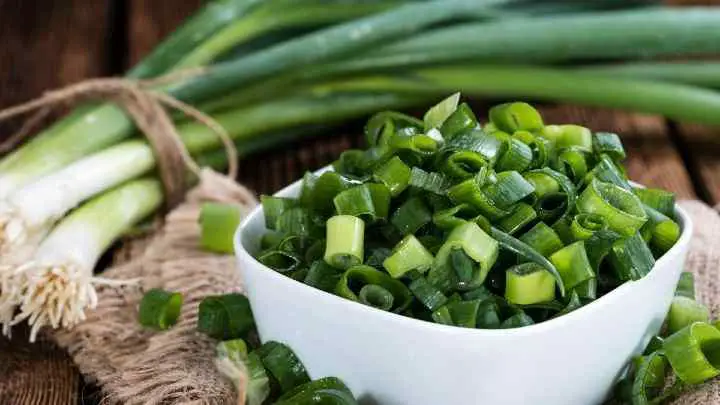Can you freeze scallions? I’ve wondered about that for a long time. So I decided to do a little research to figure out if it’s possible.
Luckily for everyone, the answer is yes. Freezing scallions is the best way to preserve their flavor and freshness so that you can enjoy them for a long time.
This article will help you understand what scallions are, how to freeze them, how long you can freeze them, and more. Keep reading to find out.
What Are Scallions?
Scallions (also known as green onions) are a type of onion with a milder flavor than other varieties of onions. They grow in many parts of the world, but they’re most commonly found in Asia, Europe, and South America.
Scallions are a wonderful addition to any meal. You can use them as a garnish or add them to sandwiches, salads, and other dishes. They’re also great for adding color to your dishes without adding calories or fat.
You can find fresh scallions at your local farmers’ market or grocery store. If you live near an Asian market, you can also find fresh scallion bulbs besides the scallion greens.
SEE: All You Should Know About the Shelf Life Of Onions
Can You Freeze Scallions?
Yes, you can. Although scallions are a great vegetable to add to your diet, they don’t last long in the fridge. If you want to save them for later, you should freeze them.
Freezing scallions extends their shelf life and makes them less susceptible to browning when you thaw them. You can use frozen scallions in many recipes, including soups, sauces, salads, stir-fries, and braises.
Why Should You Freeze Scallions?
One reason is that it makes cooking so much easier. The second reason is that it’s simply cheaper than buying fresh scallions every week or two.
Plus, if you have leftover pieces from a previous meal, you can use them later in the week. Just throw them into a salad or use them as an ingredient in soups, stir-fry, and other dishes.
How to Freeze Scallions
Here are three methods of freezing scallions that work well:
Raw
- Cut off the root end of the scallions and wash well. Avoid freezing scallions with roots because the roots will be too tough to eat, and the remaining part of the scallions will be bitter.
- Place the cleaned scallions on a baking sheet and then place them in the freezer for some minutes to harden up. This process will ensure that your scallions will be easy to grab and use when you need them for recipes.
- Transfer the scallions into a freezer bag or an airtight container (they’ll be ready to use when you need them).
Blanched
- Cut the roots off the scallions and wash well. Don’t allow any dirt or debris to remain on the scallions because this will prevent them from freezing completely.
- Blanch the scallions in boiling water until they’re just wilted and crisp-tender, then shock them in ice water to stop the cooking process.
- Pat dry with paper towels and lay them on a baking sheet lined with paper towels.
- Place them in the freezer for 30 minutes, then transfer them to airtight containers or freezer bags for storage.
Chopped
- Wash and trim off the roots from the scallions.
- Chop the white parts into 1/4-inch pieces and cut off any brown spots from the leaves.
- Cut each scallion in half lengthwise, then into quarters lengthwise, so that you have 6 pieces from the scallion.
- Place the chopped pieces onto a cookie sheet and put them in the freezer for at least 30 minutes to harden up before freezing them.
- Place the chopped scallions into a freezer bag or an airtight container and freeze until ready to use.
SEE: Check Out the Tasty Treats the Lazy Dog Restaurant Menu Offers
How to Thaw Scallions
The easiest way to thaw scallions is in the refrigerator or at room temperature overnight. If you don’t have time for that, you can also put them in a bowl of hot water for 10 minutes or until they’re soft.
After thawing, chop off any unwanted parts from the scallions and use them as needed. Scallions have a slight onion flavor and a bit of crunch that is perfect for adding to salads, stews, stir-fries, and other dishes.
Can You Freeze Scallion Pancakes?
Yes, you can. You just need to make sure that you encase the scallions well in plastic wrap before you freeze them so that they keep their shape.
To defrost, place the pancakes on a plate and microwave on high until they are soft but not hot (about 15 seconds).
SEE: At What Griddle Temp Can You Make Pancakes?
Can You Freeze Scallion Salad?
The answer is yes. You can prepare a large batch of scallion salad, toss it with some oil and vinegar and freeze it in containers with lids or freezer bags for later use.
To thaw the salad, simply place it in the refrigerator overnight or at room temperature for 1 hour (or more).
How Long Can You Freeze Scallions?
According to the USDA, you can freeze scallions for up to four months. If you want to use frozen scallions of the best quality, I recommend using them within three months of freezing.
SEE: You Probably Didn’t Know That You Can Freeze These Foods
Pros of Freezing Scallions
- Longer storage: Freezing scallions is an easy way to keep them for months without spoiling. Just freeze them in any amount you want and then thaw out what you need when you need it.
- You can buy in bulk: Save money by buying scallions in bulk instead of buying fresh ones from the grocery store each week.
- Easy transport: Another benefit of freezing scallions is that frozen scallions are easy to transport. You can even freeze them in little bags or plastic containers if you need to take them somewhere and don’t want the whole bunch all at once.
- Always have them handy: Another obvious benefit is that you can use frozen scallions all year round no matter where you live. If you always keep a large bag in your freezer, you’ll never have to worry about having scallions on hand.
- You can reuse leftovers: If you’ve got any leftovers from last week’s dinner that need using up today, frozen scallions will work wonders. Just thaw out what you need and cook it just like normal.
Cons of Freezing Scallions
- Soft texture: The cold temperature in the freezer may cause the scallions to get soft and lose their crunch after thawing. To prevent this, make sure you use a freezer bag or an airtight container to freeze your scallions.
SEE: Get Free Food Coupon at Krispy Kreme
FAQs
Can you substitute onions for scallions?
Yes, you can. If you don’t have scallions on hand, you can use onions instead. The main difference between the two vegetables is that scallions are more delicate and milder tasting than onions.
Onions are a very versatile vegetable that you can use in many different ways. You can serve them raw as part of a salad or use them in any recipe that calls for scallions.
Are scallions healthy?
Yes, there are. Scallions are high in vitamin C, folate, potassium, vitamin A, fiber, manganese, and carotenoids. They also contain several B vitamins, including thiamin, riboflavin, niacin, and B6.
Can you use scallions in salad recipes?
Yes, you can. Scallions are a great way to add color and flavor to salads, stir-fry dishes, and soups. Scallions are also traditionally used as a garnish on top of dishes that contain eggs and cheese, such as omelets.
Where can you get scallions?
Scallions are available in the produce section of most grocery stores and supermarkets. You can also find them in Asian markets, Latin American markets, and farmers’ markets.
When buying scallions, ask your grocer when they were picked — scallions are freshest when they’re picked early in the morning. Be sure to choose a firm, unblemished bunch with as many leaves as possible attached to the bulb.
Conclusion
Scallions are a great addition to your diet, but they don’t last long in storage. If you’re looking for ways to preserve this popular onion and use it throughout the year, freezing is the best option.
You can freeze your scallions raw, blanched, or chopped into strips. Not only will this help save money and ensure that you have plenty of scallions on hand, but it also helps preserve their freshness and flavor.
Thanks for reading.
Visit Cheffist for more articles on scallions.






